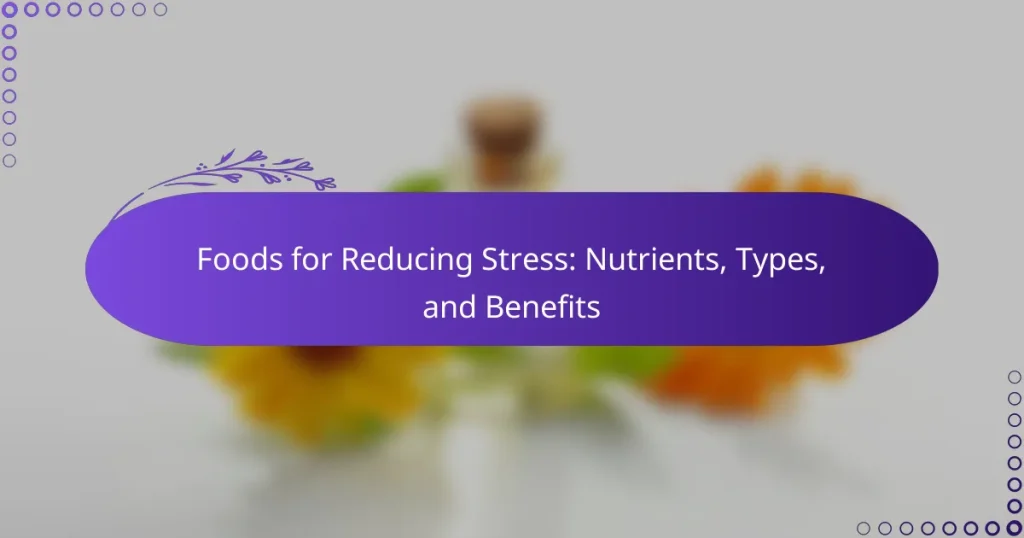In today’s fast-paced world, incorporating stress-reducing foods into your diet can be a powerful way to enhance mental well-being. Nutrient-rich options like dark chocolate, leafy greens, and fatty fish not only support brain function but also promote relaxation and emotional stability. By focusing on these foods, you can effectively manage stress levels and improve your overall mood.
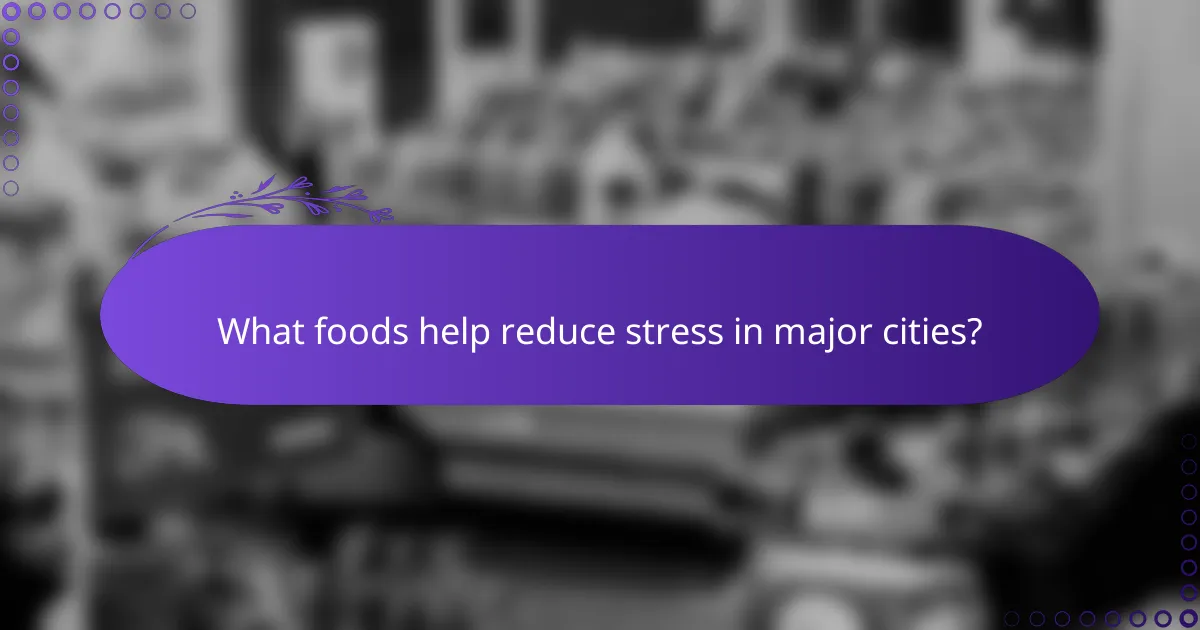
What foods help reduce stress in major cities?
In major cities, foods that help reduce stress include dark chocolate, leafy greens, fatty fish, nuts and seeds, and fermented foods. These options are rich in nutrients that can enhance mood and promote relaxation, making them effective choices for urban dwellers facing daily pressures.
Dark chocolate
Dark chocolate is known for its ability to lower stress levels due to its high content of flavonoids, which can improve blood flow to the brain and reduce inflammation. Consuming a small piece, ideally with at least 70% cocoa content, can provide a quick mood boost.
Limit your intake to about 1 ounce per day to avoid excess sugar and calories. Look for brands that use minimal additives to maximize health benefits.
Leafy greens
Leafy greens like spinach, kale, and Swiss chard are packed with magnesium, a mineral that plays a crucial role in regulating stress hormones. Incorporating these vegetables into your diet can help maintain balanced cortisol levels.
Aim to include at least one serving of leafy greens in your meals daily. Consider salads, smoothies, or sautéed dishes as easy ways to boost your intake.
Fatty fish
Fatty fish such as salmon, mackerel, and sardines are rich in omega-3 fatty acids, which have been shown to reduce anxiety and depression. These healthy fats support brain health and can improve overall mood.
Try to consume fatty fish at least twice a week. If fresh fish is not readily available, canned options can be a convenient alternative.
Nuts and seeds
Nuts and seeds, including almonds, walnuts, and flaxseeds, are excellent sources of healthy fats, protein, and fiber, which can help stabilize blood sugar levels and reduce stress. They are also high in antioxidants, which combat oxidative stress in the body.
Incorporate a handful of nuts or seeds into your snacks or meals each day. Be mindful of portion sizes, as they are calorie-dense.
Fermented foods
Fermented foods like yogurt, kefir, sauerkraut, and kimchi are beneficial for gut health, which is closely linked to mental well-being. The probiotics in these foods can help improve mood and reduce anxiety.
Include a serving of fermented foods in your diet daily to support gut health. Look for options with live cultures for maximum benefits.
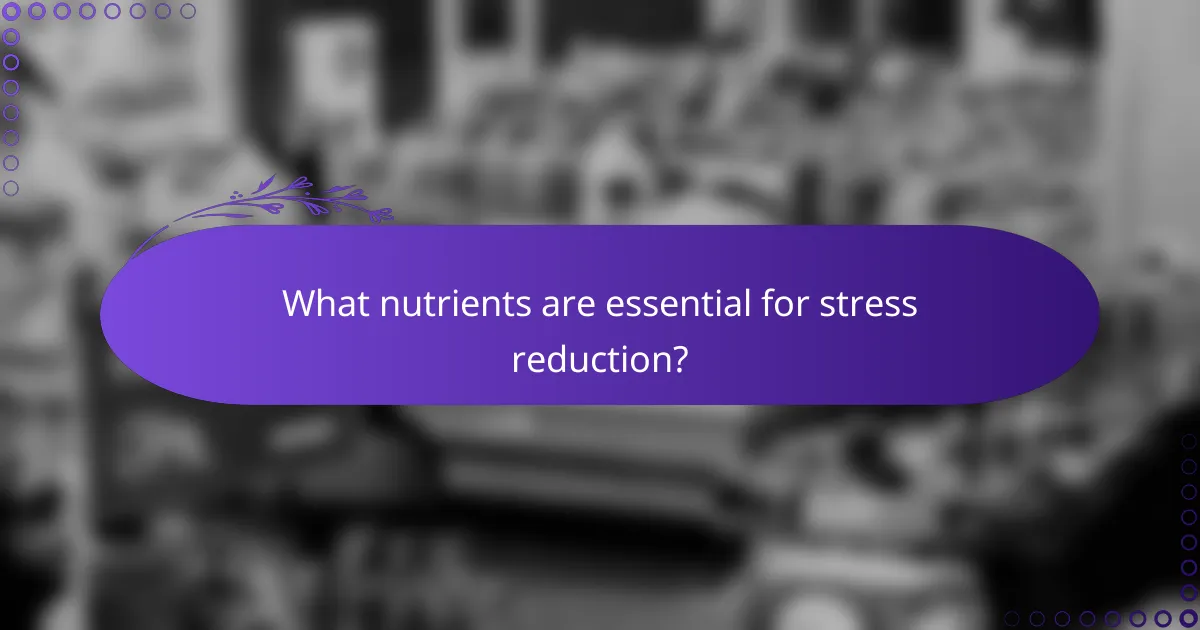
What nutrients are essential for stress reduction?
Several key nutrients play a vital role in reducing stress by supporting brain function and regulating mood. Incorporating foods rich in these nutrients can help manage stress levels effectively.
Omega-3 fatty acids
Omega-3 fatty acids are crucial for brain health and can significantly lower stress and anxiety levels. They are found in fatty fish like salmon, walnuts, and flaxseeds, which can be easily added to your diet.
Research suggests that consuming two servings of fatty fish per week may provide optimal benefits. If you’re not a fan of fish, consider omega-3 supplements, but consult a healthcare provider for appropriate dosages.
Magnesium
Magnesium helps regulate neurotransmitters that send signals throughout the nervous system, making it essential for stress management. Foods high in magnesium include leafy greens, nuts, seeds, and whole grains.
A daily intake of 310-320 mg for women and 400-420 mg for men is recommended. Be cautious with magnesium supplements, as excessive intake can lead to digestive issues.
Vitamin B complex
The Vitamin B complex, particularly B6, B9 (folate), and B12, is vital for energy production and mental clarity, which can help mitigate stress. Sources include whole grains, eggs, dairy products, and legumes.
Ensuring adequate intake of these vitamins can support mood regulation. If you’re considering supplements, look for a B-complex formula that meets daily requirements without exceeding recommended levels.
Antioxidants
Antioxidants combat oxidative stress in the body, which can contribute to anxiety and depression. Foods rich in antioxidants include berries, dark chocolate, and green tea.
Incorporating a variety of colorful fruits and vegetables into your diet can enhance your antioxidant intake. Aim for at least five servings of fruits and vegetables daily to maximize these benefits.
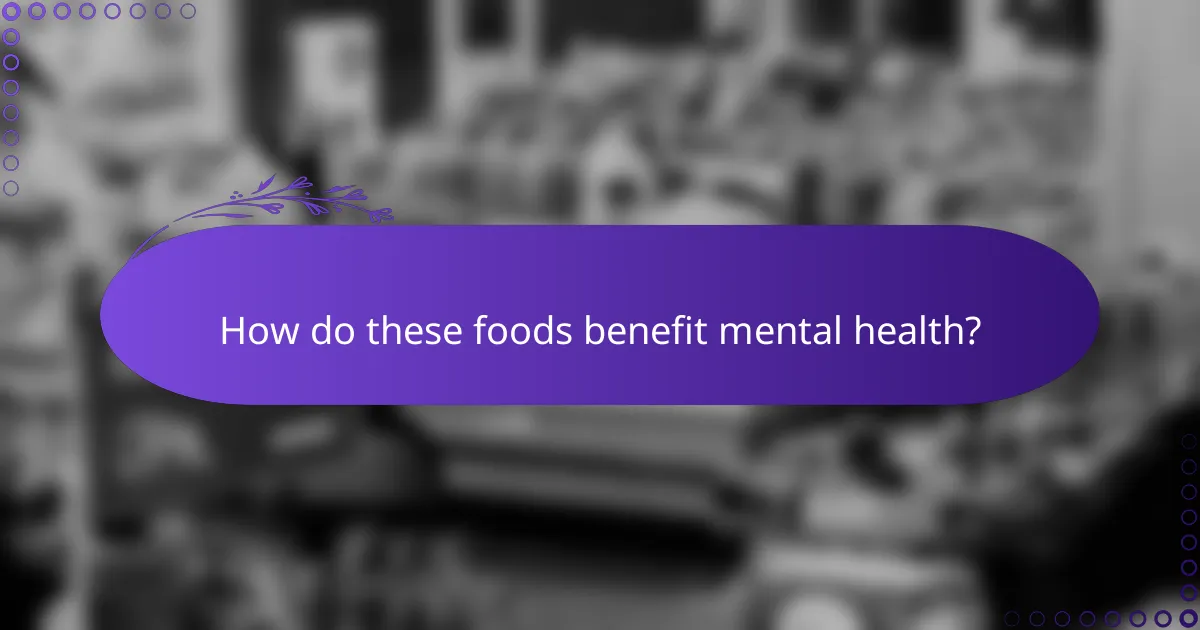
How do these foods benefit mental health?
Foods that reduce stress can significantly enhance mental health by providing essential nutrients that support brain function and emotional stability. Consuming a balanced diet rich in these foods can lead to improved mood, better cognitive performance, and lower anxiety levels.
Improve mood
Certain foods, particularly those high in omega-3 fatty acids, vitamins, and minerals, can positively influence mood. For example, fatty fish like salmon and walnuts are known for their omega-3 content, which has been linked to reduced symptoms of depression.
Incorporating fruits and vegetables, especially those rich in antioxidants like berries and leafy greens, can also help elevate mood. Aim for a variety of colors on your plate to ensure a broad spectrum of nutrients that support emotional health.
Enhance cognitive function
Nutrients such as omega-3 fatty acids, antioxidants, and B vitamins are crucial for cognitive performance. Foods like blueberries, nuts, and whole grains can enhance memory and concentration by promoting healthy brain function.
Regular consumption of these brain-boosting foods can lead to improved focus and mental clarity. Consider including foods like dark chocolate and green tea, which contain compounds that may enhance cognitive abilities.
Reduce anxiety levels
Foods rich in magnesium, such as leafy greens, nuts, and seeds, can help lower anxiety levels. Magnesium plays a role in regulating neurotransmitters that send signals throughout the brain, which can help stabilize mood.
Additionally, complex carbohydrates found in whole grains can increase serotonin levels, a neurotransmitter that helps regulate mood and anxiety. Incorporating these foods into your diet can create a calming effect on the mind.
Support overall well-being
A balanced diet that includes stress-reducing foods contributes to overall well-being by promoting physical health and emotional balance. Foods rich in fiber, healthy fats, and lean proteins can help maintain stable energy levels and reduce fatigue.
Moreover, staying hydrated is essential for mental clarity and emotional stability. Aim to drink adequate water throughout the day, and consider herbal teas that may have calming effects, such as chamomile or lavender.
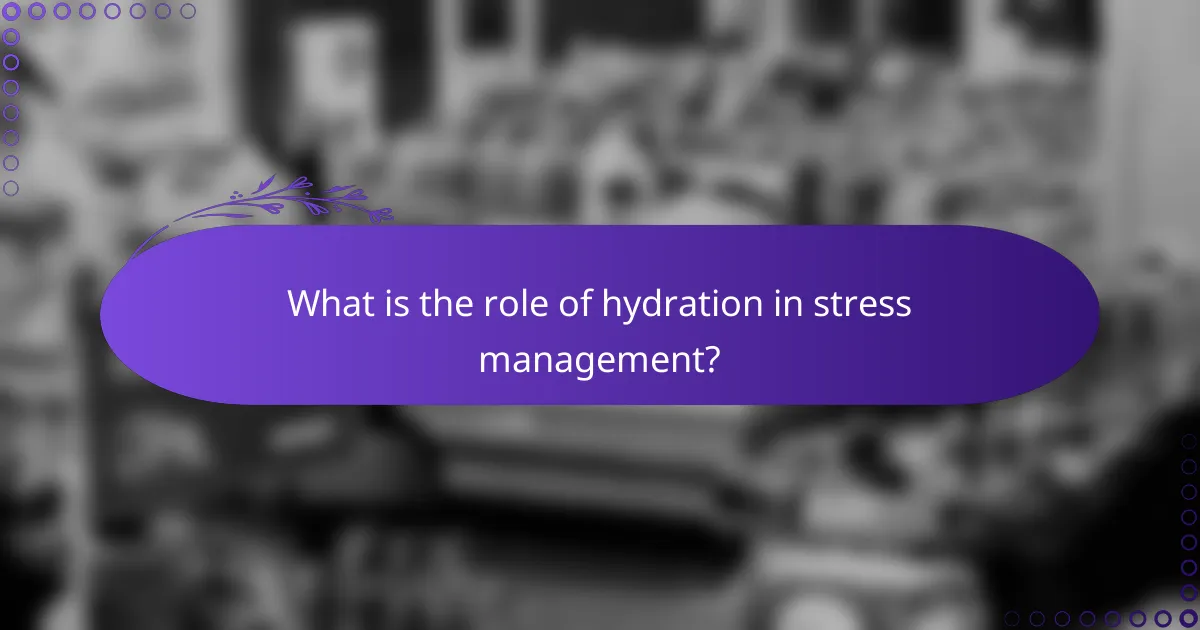
What is the role of hydration in stress management?
Hydration plays a crucial role in stress management by supporting overall physical and mental health. Adequate water intake helps maintain bodily functions, which can reduce feelings of stress and anxiety.
Maintains energy levels
Staying hydrated is essential for maintaining energy levels throughout the day. Dehydration can lead to fatigue, making it harder to cope with stressors. Aim for about 2 to 3 liters of water daily, adjusting based on activity level and climate.
To ensure proper hydration, consider drinking water regularly rather than waiting until you feel thirsty. Incorporating hydrating foods like fruits and vegetables can also contribute to your daily intake.
Affects mood regulation
Hydration significantly impacts mood regulation, as even mild dehydration can lead to irritability and increased stress. Studies suggest that drinking enough water can enhance cognitive function and emotional stability.
To improve mood through hydration, keep a water bottle handy and set reminders to drink throughout the day. Herbal teas and electrolyte-rich beverages can also be beneficial, especially during stressful periods.
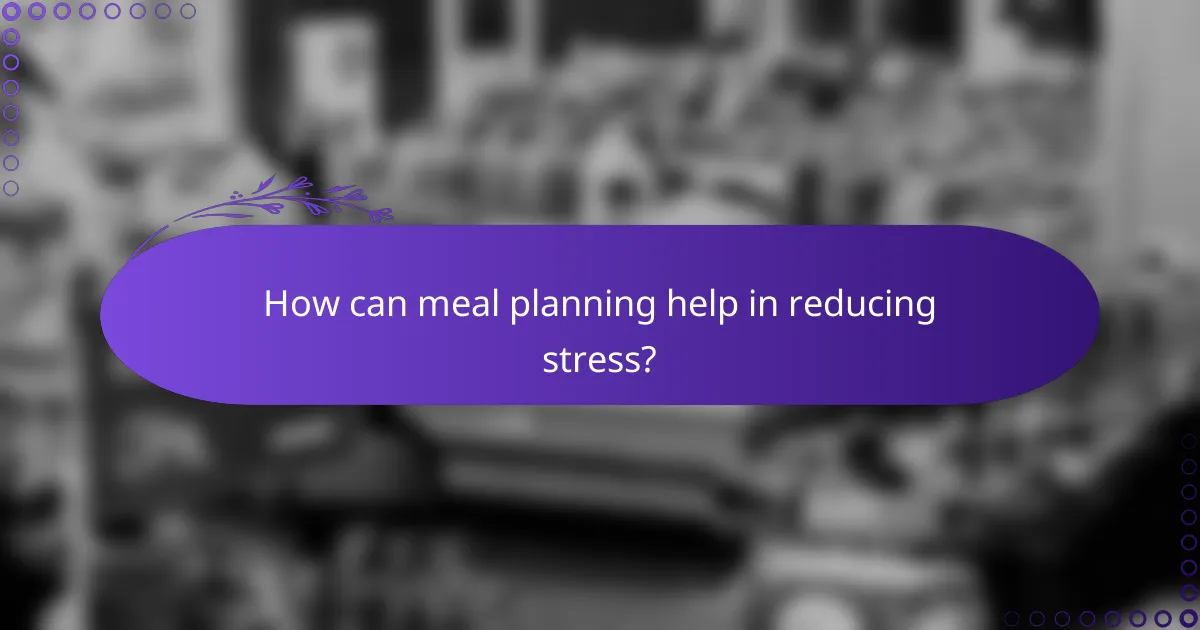
How can meal planning help in reducing stress?
Meal planning can significantly reduce stress by providing structure and predictability in your eating habits. By organizing meals in advance, you can ensure a balanced diet that supports mental well-being and minimizes last-minute decisions.
Promotes healthy eating habits
Meal planning encourages the selection of nutritious foods, which can enhance mood and energy levels. By preparing meals ahead of time, you are more likely to include a variety of fruits, vegetables, whole grains, and lean proteins, all of which contribute to overall health.
To promote healthy eating, consider creating a weekly menu that incorporates different food groups. Aim for at least five servings of fruits and vegetables daily, and include sources of omega-3 fatty acids, such as fish or flaxseeds, known for their stress-reducing properties.
Reduces decision fatigue
Decision fatigue can lead to unhealthy food choices, especially when you are stressed or busy. Meal planning eliminates the daily dilemma of what to eat, allowing you to focus your mental energy elsewhere.
To effectively reduce decision fatigue, set aside time each week to plan your meals and snacks. Create a shopping list based on your plan to streamline grocery shopping. This practice not only saves time but also helps you stick to your dietary goals, making it easier to maintain a healthy lifestyle.
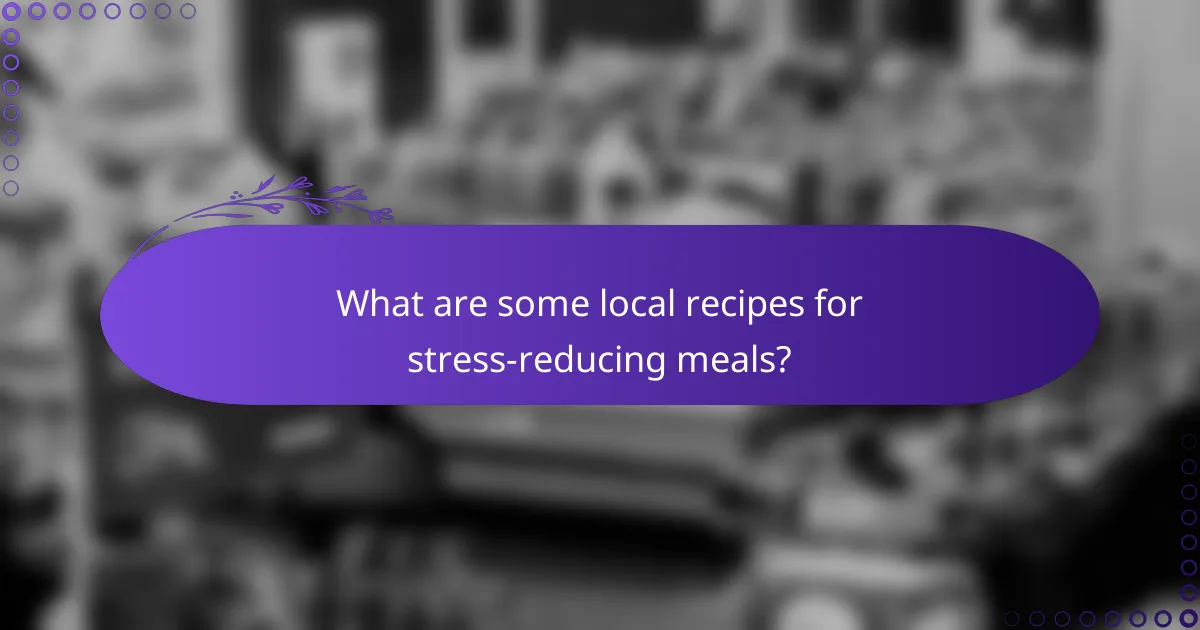
What are some local recipes for stress-reducing meals?
Local recipes for stress-reducing meals often incorporate ingredients known for their calming properties, such as whole grains, leafy greens, and omega-3 rich fish. These meals can be both nutritious and comforting, making them ideal for managing stress levels.
Examples of stress-reducing ingredients
Common stress-reducing ingredients include foods rich in magnesium, such as spinach and nuts, which help regulate cortisol levels. Omega-3 fatty acids found in fish like salmon and mackerel are also beneficial, as they can improve mood and reduce anxiety. Whole grains, like brown rice and oats, provide a steady source of energy and can help stabilize blood sugar levels.
Simple recipes to try
One easy recipe is a quinoa salad with spinach, cherry tomatoes, and walnuts, drizzled with olive oil and lemon juice. This dish combines whole grains, leafy greens, and healthy fats, making it a perfect stress-relief meal. Another option is a baked salmon fillet seasoned with herbs and served with steamed broccoli and brown rice, providing a balanced meal rich in omega-3s and fiber.
Cooking tips for stress relief
Cooking can be a therapeutic activity, so consider preparing meals in a calm environment. Use fresh ingredients and take your time to enjoy the process. Avoid multitasking in the kitchen to minimize stress; focus on one dish at a time. Additionally, consider meal prepping to save time during busy weeks, allowing you to have healthy, stress-reducing meals ready to go.
